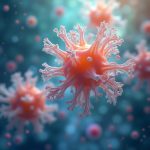In the realm of medical breakthroughs, a groundbreaking discovery is providing new hope for lung cancer patients. Researchers have found an innovative way to enhance the effectiveness of lung cancer treatments by infusing healthy mitochondria directly into tumors. This technique not only bolsters the immune response but also significantly increases the efficacy of traditional chemotherapy treatments like cisplatin, all without adding any increased toxicity (source: ScienceDaily).
iN SUMMARY
- 🔬 Healthy mitochondria transplanted into tumors enhance immune response.
- 💪 Combination with cisplatin makes chemotherapy more effective.
- 🦠 Tumor metabolism is reversed, empowering immune cells.
- 🛡️ Achieved with no added toxicity, offering a safer option for patients.
Think of it this way: the mitochondria are like tiny power plants inside our cells, responsible for generating the energy required for them to function properly. In individuals battling lung cancer, tumor cells use up an extraordinary amount of energy, often leaving the body's natural defenses struggling to keep up. By introducing a supplement of healthy mitochondria, researchers are effectively giving the immune cells a much-needed energy boost to fight the illness more efficiently.
Understanding the Role of Mitochondria
The mitochondria in our cells are crucial for energy production. They convert nutrients into adenosine triphosphate (ATP), the energy currency of a cell. In cancerous cells, however, the mitochondria often become dysfunctional, which contributes to tumor growth and helps these cells evade the immune system. In simple terms, sick mitochondria are failing to keep the patient’s cells in fighting shape.
By transplanting healthy mitochondria into lung cancer tumors, scientists have created a scenario where the immune system can recognize and attack cancer cells more effectively. This revolutionary approach combines advancements in cellular biology with the strategic use of chemotherapy to alter tumor metabolism.
Integrating Mitochondrial Transplant with Chemotherapy
We often hear about chemotherapy as a catch-all term for cancer treatment. Cisplatin, a well-known chemotherapy drug, is notorious for its side effects but immensely powerful in its ability to destroy fast-growing cancer cells. Unfortunately, its effectiveness can dwindle in cells with altered metabolism, typical in tumors. According to the researchers, integrating healthy mitochondria transplants with cisplatin demonstrated a marked increase in effectiveness while simultaneously lowering potential side effects (source: ScienceDaily).
This method's beauty lies in its elegance—it alters the cellular environment within the tumor, reversing harmful metabolic changes and enabling the immune system, as well as chemotherapy, to work in synergy. This result is especially promising for people in cities like Toronto, where healthcare innovation is paramount.
Supporting Patients Along the Journey
Aside from the science, it’s essential to consider the human element. For many facing lung cancer, treatment can be isolating, exhausting, and at times demoralizing. This newfound approach offers a glimmer of hope by potentially reducing the harshness of treatment while increasing its efficacy, making it a gentler journey for the patient.
It’s not only the medical community buzzing with optimism, but this innovation has the potential to ripple into how cancer treatments are crafted worldwide. One could be inspired to think it might shape how treatments are administered in places like New York, renowned for its medical institutions and expert healthcare professionals.
Practical Implications and Future Outlook
The exciting news doesn’t stop here. With such promising initial results, the next steps might involve extensive clinical trials, possibly across various geographic regions, which could include collaborative efforts with leading Canadian cities like Montreal and Calgary.
Using a combination of healthy mitochondria with established chemotherapy treatments could redefine cancer care and improve quality of life for patients everywhere. It's a good reminder of the incredible advancements awaiting us when the boundless curiosity and dedication of scientists meet pressing human needs.
Conclusion: The Power of Hope in Science
As we look to the future, this kind of ingenuity provides a beacon of hope and a scenario where more people can live fuller lives post-diagnosis. The next leap will be to see such therapies become mainstream, hopefully making aggressive cancer treatments more humane and perhaps more accessible.
What would you do if a loved one could benefit from this breakthrough? How might this shift in approach change not only the patient experience but also the wider medical landscape? Share your thoughts with the iNthacity community and consider applying to become part of our online community of bright minds and compassionate souls.
Remember, embracing such progress in medical research isn’t just hope—it's a testament to our collective ability to rise above challenges with science and heart. Until then, may we find power in the mitochondria and the determination to keep pressing forward.
Disclaimer: This article may contain affiliate links. If you click on these links and make a purchase, we may receive a commission at no additional cost to you. Our recommendations and reviews are always independent and objective, aiming to provide you with the best information and resources.
Get Exclusive Stories, Photos, Art & Offers - Subscribe Today!
























Post Comment
You must be logged in to post a comment.